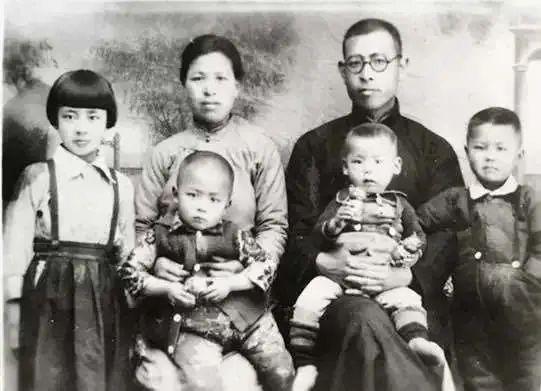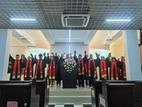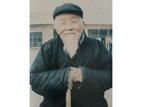Although I only lived with my grandfather for a couple of years, his character and his convictions had a profound effect on me.
My grandpa, Pastor Pan Yanggui, served the church in Linfen, China's north Shanxi Province before liberation. He studied theology at the Shanxi Hongtong Bible College, which was a part of the Shanghai Jiangwan Bible School. After graduation, he preached sermons in Beijing Oriential Missionary Society, Tianjin (Tianjin Dazhigu Church), Hebei (Zhangjiakou Church), Mongolia, and the Suiyuan region. In the 1950s, he was a member of the Shanxi Protestant Three-Self Patriotic Movement and a CPPCC member of Linfen County (later changed to Linfen City) in Shanxi Province. Before he died, he was a pastor of the Christian Church in Linfen City, Shanxi Province.
My grandfather was born in Xiaoyu Village, Jindian Town, Yaodu District, Linfen city, Shanxi Province, on February 28, 1904.
My grandfather's father, Pan Dengying, was a martial art master in the late Qing Dynasty. He was generous and often helped the poor. Because of his youthful arrogance, once he quarreled and fought with others. When he was defending himself against an attack, he accidentally bounced a spade on his opponent's head and killed him. Then he was put into prison. To save his life, his family sold their land so he could be released from prison, and his family fell into ruin.
At the age of about ten, grandpa went up to the mountains to cut firewood. He carried it to the city to sell, and sometimes worked as a day laborer for others. Once, grandpa went to town to sell firewood. When my grandfather was fifteen (1919), he saw a group of people reading and writing in a school, and his heart was filled with envy. So he walked into the school. It was the Linfen church founded by the China Inland Mission. He saw that the people inside were different from the people in his life, each with a look of peace and joy on their faces.
Each day after he had finished his work or selling wood, the first thing he did was go to church to listen to the sermon and learn hymns. After a long time, the elders in charge of the church thought about this young man, and they learned from talking to him that so many things had happened in my grandfather's home, so they arranged for him to work as a clerk in the church. At the time that he began working at the church he did not believe in the Lord.
Grandpa was mainly responsible for cleaning inside and outside the church. He rang the bell at the correct times, and did all the chores of the church. He worked diligently, learned to read, then he read the Scriptures, and received Christ into his life and was baptized. At that time, Pastor Yang Shaotang (1898-1969) a native of Quwo, Shanxi Province, often preached in the Linfen area. He wanted to help my grandfather develop spiritually, so he often had him read the Bible and also took him out to preach.
In 1922, Linfen Church recommended that grandpa study at the Hongdong Yufeng Mountain Bible College. After graduation, he remained at the school as a teacher. Later, My grandfather was recommended by Pastor Yang to study at Shanghai Jiangwan Theological Seminary.
After a journey of more than three months, my grandfather found himself standing at the gate of the seminary. His clothing was poor and he needed to pay two hundred dollars to go to school. Despite this, he said that he had enough strength to work. Because of Pastor Yang's recommendation, grandpa was exempted from the tuition charge and was part of a work-study program in which he used as a building bellman. His roommates and other teachers and classmates knew about grandpa's education experience, and they also extended their hands to help him. Some gave him clothes and some gave him shoes and socks...... After graduating in 1930, it was recommended that he go to the Beijing Qianmen Far East Mission Church (a church of the China Inland Mission in Beijing).
In the summer of 1932, my grandfather took my grandmother, who was a nurse in the Shanxi Xinghualing Fraternity Hospital (Missionary Hospital), to Beijing to get married.
My grandmother, named Wei Shanliang (1910-1979.8.), was born in a peasant family in Hejin, Shanxi Province. She was the ninth child and also a baby girl. Because of poverty, her family abandoned her. An old sister was on her way to church on a Sunday when she heard the baby crying and picked her up and took her to Deacon Li's home in Huangcun Church.
In those days, churches were established by China Inland Mission throughout Shanxi, and many British missionaries served in the countryside of Shanxi. At that time, an English pastor and his wife were preaching in a church in the Hejin area. They had received a sum of money from an English instructor named Wei Shanliang. She hoped to adopt an orphan in China and support her until she graduated from university. When the reverend and his wife saw the baby in church, they knew it was God's arrangement.
My grandmother grew up in a church environment and lived with a British missionary couple. She could play the piano, sing hymns, and speak fluent English. When she was a teenager, grandmother was sent to Huo County Female College by the reverend and his wife. At a college party, grandpa and grandma got to know each other and fell in love with each other. When my grandfather studied in Shanghai Jiangwan Theological Seminary, my grandmother was taken to Taiyuan, the provincial capital, by the Reverend Ji and his wife, where she worked as a nurse in the Charity Hospital of the church.
In 1934, my grandparents' first child was born and was named Joan (her Bible name is Rebecca—she is my mother). My mother later had two sisters, but they both died of measles. At the time, my grandparents were living at the church with Pastor Zhou Weitong, Pastor Wang Mingdao, and Pastor Liu. My grandfather was enthusiastically evangelizing and holding street meetings with other pastors.
Before liberation, the Chinese church had no autonomy. At that time, there were Chinese missionaries serving and living with my grandfather in the church, as well as foreign missionaries. Some foreign missionaries despised the Chinese people and excluded the Chinese missionaries. Some missionaries did not respect their Chinese colleagues at all, including in some minor aspects of life. Westerners ate with small plates, bowls, plates, knives and forks, and made fun of Chinese people when they saw that Chinese people were using big bowls. My grandfather had a straightforward personality. There were times when grandpa couldn't take it anymore and argued with them. At that time, the Chinese church was in the hands of foreigners, and grandpa was treated unfairly in the church. He was forced to leave the Beijing church after he was mistreated by foreigners who told the China Inland Mission to not hire him.
From 1938 to 1940, North China was the main battlefield in the war of resistance against Japanese aggression, with chaos everywhere. My grandfather and his family preached in Chahar and Suiyuan (now Inner Mongolia, Shanxi Datong).
From 1940 to 1941, my grandfather's family lived in Dazhigu, the French Concession in Tianjin, where they served in the church. Later in the Zhangjiakou church, grandfather continued to preach as a pastor, and grandmother taught in the Sunday school.
In 1941, the war in the Pacific broke out when Japan attacked Pearl Harbor. The Japanese invaders had already invaded the hinterland of North China. Because of its strategic location and its remoteness, the Pingyang area of Linfen was occupied by the Japanese. In 1942, my grandfather's family returned to his hometown Linfen from Zhangjiakou. My grandfather continued to serve in the church.
As a pastor, my grandfather had originally planned to return to his hometown to serve his elders and brothers and sisters. However, due to the invasion of the Japanese, the church could not meet normally and the pastor could not preach in the midst of war and chaos. Many refugees came to the church for refuge. My grandfather set up a "refugee relief station" in the church at Linfen, which received and protected thousands of refugees, most of whom were fleeing famine from Henan, Hebei, Anhui, and other places, as well as poor people in the surrounding villages. Grandpa arranged the energetic and healthy among them to clean hospital supplies and doctors' coats for the church hospital, and to do some service work to maintain the basic lives. They all ate and lived in the church.
Soon after, the Japanese occupied the church completely, and the chapel of the Linfen Church became a cinema for Japanese soldiers. At that time, grandpa was looked up to by brothers and sisters in the church and fellow villagers, so the Japanese asked grandpa to be the President of the New Democratic Association, which would make him a traitor. If he did not agree with them, he would be expelled from the church immediately. So grandpa told his family to prepare to move out of the church. The next day, when the Japanese threatened him again, my upright grandfather steadfastly refused. Then, grandpa and his family were forced to leave their beloved church again. During this period, some people in the church also chose to work for the Japanese.
My grandfather's family moved to a house on Gongyuan Street in Linfen. The family had no income. From then on, grandpa bought medicine on credit in the pharmacy (Taihe Western Pharmacy) because he was trusted, and carried the medicine box to run around in the countryside to sell medicine to support his family. During this time, God also moved some brothers and sisters in the Hexi region to send grain and flour to them.
Grandfather carried the medicine box and walked through Xiangfen, Wenxi, Jiangxian, Jishan, Hejin and other places in South Jin, spreading the Gospel. During this period, my grandfather was captured twice by Japanese soldiers. Once, he was beaten black and blue, which resulted in a bone fracture in his right knee. With the help of his brothers and sisters, he survived. Grandpa also sold medicine to help the villagers and the poor, but often they did not have the money to pay him.
My mother said that at that time my grandfather was often out traveling, and grandmother and her three children would "keep kneeling down to pray." When grandpa came back, he always magically took out walnuts and dates from his sack of grain, bringing them the happiness of childhood.
At that time, my grandparents suffered from extreme poverty, but they also experienced God’s wonderful provision for life. My grandfather served in Dongpobao Church of Fencheng County and Wenxi Church. My grandfather traveled to Quwo, Houma, Anyi, Xia County, Linyi...dozens of counties in southern Shanxi.
In August 1945, the Japanese announced their unconditional surrender, and then the civil war brought another three years of war in the country. Due to the instability, my grandmother returned to Linfen Xiaoyu Village with her four children to live, and my grandfather also returned to his hometown from another county to teach. In 1947, the brothers and sisters heard that grandpa had returned, so they invited him to take charge of all the internal and external affairs of the church. Grandpa began to serve in the Linfen Church again, taking full charge of the church's ministry.
At that time, various ministries of Linfen Church were reorganized. The church was divided into the South courtyard and the North courtyard, and the chapel could accommodate 2,000 people. At the same time, the church took over Shansheng Hospital (established by the British Inland Mission, which became Linfen Special Hospital after Liberation), and my grandfather became the chairman of Shansheng Hospital. During this period, he went to Beijing twice. Large quantities of medicines and supplies were airlifted back from an American Relief Agency for the hospital.
In the spring of 1947, the People's Liberation Army came to Linfen city. At the end of 1947, the Linfen Female Teacher School, which my mother attended, was closed. As the number of patients and injuries increased rapidly, my mother worked as a nurse in Shansheng Hospital for several months, helping to treat and cure the wounded. Mother recalls that all the drugs of Shansheng hospital were supplied by the Taiyuan Red Cross American Relief Agency. Once, Taiyuan informed them that there was a shipment of drugs and relief clothes that needed to be claimed, and grandpa arranged for hospital dean Hao Zigang to go by plane to get the shipment. When the relief supply arrived, grandpa said to grandma and his family that they would not join the crowd to get these clothes and supplies.
The battle for the defense of Linfen began in March, 1948, and lasted for 72 days. The Kuomintang army in the city made a final struggle and resistance. They appointed grandfather the head of the church and the hospital. They required that water tanks be buried several meters underground. Adults and children under the age of 60 and over the age of 12 were told to listen to the noise in the water tank every night and immediately report when they heard the sound of digging.
On the eve of the liberation of Linfen on May 16, 1948, there was a machine gun battery in grandpa’s house, and behind the house was a gun position. With her children and some of her brothers and sisters in the church, grandmother shivered and hid in a cave next to the church. That night, my grandfather and the head of the mission hospital met for a board meeting with some colleagues. Early in the morning of May 17, the People's Liberation Army entered the city. Grandfather and a Kuomintang officer, Zhao Maoxuan, who also was a Christian, greeted the people's Liberation Army together. Later, when my grandfather returned to the church, the church and their house were burnt down. He could not help crying.
The church was badly damaged. All five houses connected to the church were also burned. The North Courtyard and the church lay in ruins. Only a few rows of houses remained in the South Courtyard. The piano in the Grand Chapel was also destroyed. All the belongings of my grandfather's family in the church were burned.
Before the founding of new China, Mr. Wu Yaozong sent a letter to my grandfather in Linfen Church, saying that foreigners would soon come back to China. Because all the land deeds of the church were in the name of the mainland association, he asked my grandfather to go back to Nanjing to get the land deeds for the church property. My grandfather left for Nanjing at once. It took him more than a month to carry the land deeds for more than 300 properties in Linfen Church with sacks, and then he started to check the house property of the church.
In the 1950s, my grandfather was one of the initiators of Shanxi Christian Three-self Patriotic Movement Committee and served as a member of the Standing Committee of Shanxi Three-Self Patriotic Movement Committee. Grandpa continued to preach in southern Shanxi. Due to the criticism of some people in Linfen Church, grandpa came to Hongdong Church to serve in 1953.
During the Cultural Revolution, because of her overseas connections (a daughter adopted by a British couple), and because of grandfather's status as a pastor, they could face criticism and punishment at any time. However, grandfather and grandmother avoided all kinds of persecution because they were informed in advance.
In 1970, when my mother was eight months pregnant, she went back to her family in Linfen Xiaoyu Village to give birth. I came to the world safely through my grandparents' prayers.
At that age my grandfather was thin and gentle, wearing a pair of glasses. Every morning before dawn he would go to the country road or highway to pick up dung with a basket on his back. The dung he picked up at the door piled into a small hill. In those days, due to the special status of my grandparents, all his children wrote in the column of family composition: religious professionals. With this special status, his five children were greatly affected in primary school, junior high school, senior high school, university, and even work.
During the Cultural Revolution, my mother and uncles were so frightened that they burned their Bibles. They destroyed all the photos of my grandmother and her English missionary family and the photos of my grandfather's church in Beijing and Tianjin. It was a pity to think of it later.
In 1978, reform and opening up sounded like spring thunder, and churches all over the country began to meet again. At this time, my grandfather was in his seventies, but he still went out to preach and visit his brothers and sisters. He had come to Taiyuan, the provincial capital, to live with us many times. I still remember that he brought us peanuts and sugar during Christmas.
On March 10, 1986, my 82-year-old grandfather, accompanied by all his children, went to heaven with a smile on his face. When he died, there was no money left. The only thing left was a traditional, lined Bible he had used, wrapped in blue cloth and filled with notes from where he read his Bible.
Now, following in my grandfather's footsteps, I serve as a pastor in a grassroots church in Northwest China. I pray that in every age, the Lord will raise up useful servants as precious vessels, to be the light of the times, to walk in the light!
(The author is pastor of a church in Urumqi, Xinjiang.)
- Translated by Nicolas Cao












